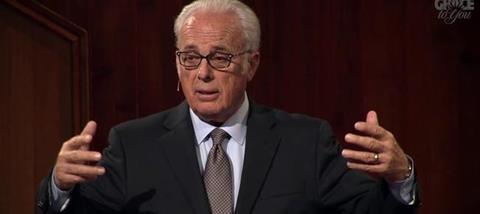
Social justice is deadly.
That’s according to thousands of Christian leaders who have put their name to a new statement which aims to rescue narrative around the gospel from the poisonous jaws of the “sociological, psychological and political theories presently permeating our culture”.
The Statement on Social Justice and the Gospel – the brain child of US pastor John MacArthur – speaks from a position of anxiety around a “nebulous rubric of concern for ‘social justice’” and a fear that the Church will be corrupted because of it and people be led away from “the grace of God in Jesus Christ”.
In short, the Christian faith is being led astray by a bunch of do-gooders who are more focused on a message of love for others than preaching the very serious message of conscious eternal torment.
To say I disagree would be an understatement. Because, to me – and to theologians over the centuries (social justice is not some new-fangled millennial trend) - the strive for social justice cannot be separated from the Christian faith.
Life before death
When Jesus said he came to bring “life in all its fullness”, he meant now. Not just in the afterlife. As we say at Christian Aid: “We believe in life before death.” That’s why we work on issues such as climate change, economic justice, gender equality, internal displacement and are right there on the ground when humanitarian emergencies hit.
We do what we do because the Christian faith speaks of a new world order. We are Christians not just because we are concerned with our eternal destiny, but because we believe in a God who redeems the whole of creation: physically, socially, spiritually. We live in between the now and the not yet of the coming of the kingdom of God.
"Jesus is portrayed by the gospels as a one-man apocalypse," writes NT Wright in How God Became King: Getting to the Heart of the Gospels. "The place where heaven and earth meet, the place where, and the means by which, people come and find themselves renewed and restored as the people of the one God, the place where power is redefined, turned upside down or perhaps the right way up."
Social justice is about turning things the right way up – the way that God intended. It is God who demands justice in a world where injustice is rife.
Out of touch
Through a series of affirmations and denials, the MacArthur statement seeks to bring clarity around what is right in this select group of church leaders’ eyes. While many of the affirmations are full of truth that I would wholeheartedly agree with (the primacy of the gospel, the imago dei, that God requires us to live justly in the world); too often its denials present a worldview that is privileged, out-of-touch, defensive and tone deaf.
The signatories would likely have been angry with Archbishop of Canterbury Justin Welby’s intervention last week in launching the IPPR report, which called for greater taxes to tackle inequality and boost the common good (Luke 18:22, anyone?). Because their statement denies "that political or social activism should be viewed as an integral component of the gospel or primary to the mission of the Church".
The section on race is startling. "While we are to weep with those who weep, we deny that a person’s feelings of offense or oppression necessarily prove that someone else is guilty of sinful behaviours, oppression, or prejudice." In other words, ethnic minorities: get over it. Get over the centuries of oppression and cruelty and injustice. The fault lies not with the oppressors but with the oppressed.
It is baffling to me that a group of Christ followers would fail to see the importance of striving for social justice. It is troubling to me that it’s possible to say you believe in the inherent dignity of all yet fail to see it as even in part your mission to tackle the structures in place in our societies that seek to oppress others and lead to alarming disparities in wealth and opportunities. And it is inexplicable to me why you would go to all this trouble to distance yourselves from fellow Christians who do.
Because, as Martin Luther King said: "Injustice anywhere is a threat to justice everywhere. We are caught in an inescapable network of mutuality, tied in a single garment of destiny. Whatever affects one directly, affects all indirectly."
































